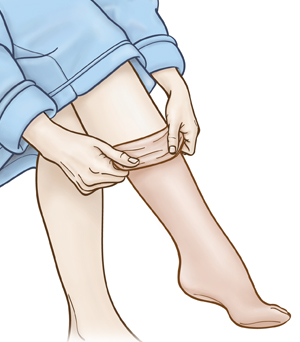Feeling dizzy or faint is very common during pregnancy. It generally doesn't mean something is wrong. It's most common during the first trimester, but it can happen anytime during pregnancy. Dizziness and fainting (syncope) are often caused by a drop in blood pressure. This is from the hormones released during pregnancy that relax the body’s blood vessels. Too little blood is then pumped up to the brain. When this happens, you lose consciousness (faint). Fainting is not dangerous to you or your baby unless you fall and hurt yourself.
Home care
To help prevent dizziness and fainting:
-
When you get up from sitting or lying down, do so slowly. Clench and release your leg muscles before and during standing.
-
Don't stand for too long. If you must stand for prolonged periods of time, wear compression stockings. These are special stockings that help keep blood flowing toward the heart. Most medical supply stores sell these stockings.
-
Don't let long breaks happen between meals. Keep snacks handy in case you get hungry.
-
Don't take hot showers or baths. Use warm water. Be careful to stand up from a bath slowly.
-
After the first trimester, don't lie on your back.
-
Try to eat every few hours. Instead of eating 3 larger meals a day, try eating 6 smaller meals. Snack on healthy foods that contain some protein, such as nuts and peanut butter.
-
If you have been told you are anemic, eating iron-rich foods may be helpful.
If you feel dizzy:
-
Sit or lie down. If you sit, put your head between your knees. If you lie down, try to get your feet higher than your head.
-
Take deep breaths. Breathe out slowly.
-
Move toward fresh or circulating air.
-
Loosen tight clothing.
-
Don't eat or drink anything while you feel dizzy.
Follow-up care
Follow up with your healthcare provider, or as advised. Arrange for prenatal care if you haven’t already. Go to all your prenatal appointments. Get prenatal tests as instructed.


